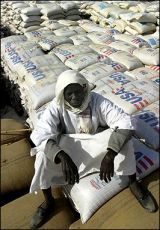Sudan risks aid loss over Egeland ban – UN
April 6, 2006 (KHARTOUM) — Sudan risks losing funding for its millions of people in need of aid because of its refusal to allow U.N. Under Secretary for Humanitarian Affairs Jan Egeland to visit crisis areas, a senior U.N. official said on Thursday.

|
|
A displaced Sudanese man guards humanitarian aid from the World Food Program at Kalma refugee camp near Nyala town in Sudan’s south Darfur region . |
“If people feel that our capacity to operate is restricted so much … all these things make donors think maybe it’s better to use the money in other places,” said Manuel Aranda da Silva, the U.N. humanitarian coordinator in Sudan.
He added the main reason for Egeland’s visit was to mobilise cash for Sudan.
On Monday Egeland said the government refused to allow him to visit Darfur because of a Muslim holiday and indicated he was not welcome in the capital Khartoum. He was also refused permission to fly over Darfur to visit Sudanese refugees in neighbouring Chad.
Egeland said it was because he was outspoken on the need for a U.N. takeover of the cash-strapped African Union mission monitoring a shaky truce in Sudan’s remote west. Khartoum is hostile to U.N. troops in the region.
“This is bad management,” said da Silva, of the government’s decision to inform Egeland he was not welcome when he was already in the south of the country, despite having agreed weeks ago on the dates.
He said the government’s statement that it could not ensure Egeland’s safety indicated they could not control security in Darfur, where three years of rebellion created one of the world’s worst humanitarian disasters with 2 million people living in squalid camps.
Sudan insists the security situation is good in Darfur and that they are able to stem the violence, which has escalated in recent months forcing 150,000 more people to flee their homes and leaving 300,000 more out of reach of vital aid.
Da Silva said the restrictions the government imposed on aid workers, including expelling the Norwegian Refugee Council this week, were some of the most severe in the world.
“In my experience Sudan is one of the most difficult places to work, there’s no doubt about it,” da Silva told reporters in Khartoum.
He said the government had received almost $2 million in the past month from visas for aid workers alone, which made donors think the money could be better used elsewhere.
“Sudan is one of the last countries in the world where people still require travel permits to travel to any states,” he said, adding emergency law had been lifted in most parts of the country but travel restrictions remain.
Tens of thousands have been killed in the Darfur violence, which Washington calls genocide. Khartoum denies the charge but the International Criminal Court (ICC) is investigating alleged war crimes in the region.
Opposition politicians say Khartoum is hostile to a U.N. peacekeeping mission in Darfur because they are worried those forces could arrest those wanted by the ICC.
Senior government and military officials have been implicated in mass abuses in Darfur.
(Reuters)
